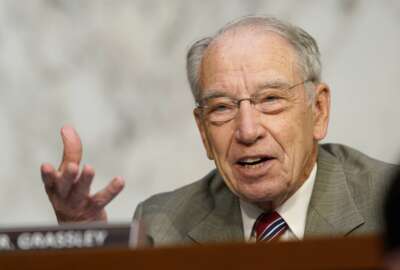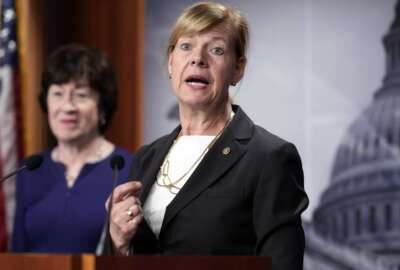The Federal Headlines is a daily compilation of the stories you hear discussed on Federal Drive with Tom Temin.
In today’s Top Federal Headlines, the Navy lays out its policies for sailors who are looking to transition to another gender.
- The Navy has announced guidance for transgender sailors. The branch said applicants must receive a diagnosis from a military medical provider saying their gender transition is medically necessary. No changes will be made to the Navy’s physical readiness program. It will be making some language adjustments to its urinalysis program and the military equal opportunity policy. (Navy)
- Election Day! The Justice Department has sent 500 observers to 67 jurisdictions in 28 states to help stop fraud. That’s fewer than in past years because of a Supreme Court ruling on a provision in the Voting Rights Act. The civil rights division staffs a hotline for voters who feel they are wrongly denied ballots. (Department of Justice)
- The Defense Department has toughened rules for companies applying for research and development contracts. Applications must promise to share more of their research plans with DoD. And they face more exacting accounting rules to ensure R&D money doesn’t subsidize work on other contracts. (Federal Register)
- A newly released survey has found more than a third of Air Force personnel think their units are understaffed. The full results of the service’s 2015 climate survey — first obtained by the San Antonio Express-News — show only 63 percent of airmen answered “yes” to the question: “We have enough people on my team to accomplish the job.” The figure was even lower for Air Force officers, only 56 percent of whom answered yes. The Air Force has acknowledged it’s gone too far with personnel cuts, shrinking by 25 percent in the past 30 years. The service grew by 7,000 airmen in 2016, and may ask Congress for permission to add another few thousand over the coming year. (Air Force)
- A pair of congressman would like the Federal Trade Commission to have a larger role in securing the Internet of Things. Reps. Frank Pallone (D-N.J.) and Jan Schakowsky (D-Ill.) have asked FTC Chairwoman Edith Ramirez to make sure manufacturers put in security measures like forcing consumers to change default passwords during the setup process. (House Energy and Commerce Committee)
- OMB has released a major update to federal cybersecurity reporting. Agencies have a new definition of what is a major cyber incident. The Office of Management and Budget issued the update as part of its fiscal 2017 Federal Information Security Management Act (FISMA) guidance. OMB said the new definition of a major cyber incident is one that is likely to result in demonstrable harm to the national security interests, foreign relations or the nation’s economy. It also is one that harms the public’s confidence, civil liberties or health and safety. (The White House)
- An industry association is pressing for the Senate to take action to modernize federal IT. The Professional Services Council wrote a letter to Senate leaders urging them to support and vote on the MOVE-IT Act. The House-passed bill would create working capital funds in each agency, and a governmentwide fund to support the efforts to move off of old technology. PSC said there is a very limited window for the Senate to act to improve federal IT and cybersecurity posture. (Professional Services Council)
- Veterans submitted over 54,000 applications for health benefits using the new online form on Vets.gov. The U.S. Digital Services team said that’s way more than the legacy system would have been able to accept in five months. The new application is available on Vets dot gov. VA wants to establish one location where veterans can interact with the department. (U.S. Digital Service)
- U.S. health officials are smitten by the health system in Cuba. Health and Human Services secretary Sylvia Burwell visits Havana to further what she describes as the administration’s vision for a new relationship with the communist island. At a clinic, Burwell said she learned about Cuban advances in neurology, infant mortality and treating Alzheimer’s disease. She said the U.S. and Cuba will establish health-related partnerships on cancer research, Zika and providing access to care. (Health and Human Services)
Copyright
© 2024 Federal News Network. All rights reserved. This website is not intended for users located within the European Economic Area.





